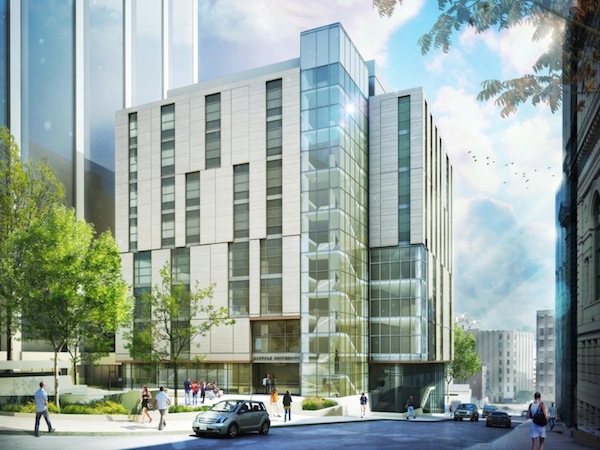The Boston Redevelopment Authority board yesterday unanimously approved Suffolk University’s plans to move forward with a new campus building at 20 Somerset St. that will feature general-use and science classrooms, a light-filled cafeteria/function space, and indoor and outdoor lounging areas.
The BRA determined that the building is in accord with the University’s Master Plan and that its impacts – which include relocating all academic classrooms from the residential part of Beacon Hill – will benefit the neighborhood. The University will now work with city, state, and preservation officials to finalize the design for the $62 million building and move forward with construction.
“This building will provide the flexible academic facilities essential for today’s learning and teaching environment,” said Suffolk University President James McCarthy. “At the same time, it shows the value of partnering with neighbors, elected officials and city agencies to find solutions that benefit all.”
The sleek new building, expected to open in summer 2015, will encompass 112,000 square feet in 10 floors, two of them partially or fully below grade. There will be four floors each of general-education and science classrooms of various sizes, providing 1,100 classroom seats. It also will include student support services.
The neighborhood will benefit as active use is restored at the site of the old MDC headquarters, which will be replaced with a building designed to be respectful of its surroundings. The new building will be adjacent to open space, and the state-owned Roemer Plaza will be landscaped to provide an inviting area for students and neighbors to gather.
The University will refit the Donahue and Archer buildings for office space and eventually sell its Fenton Building and annex on Derne Street and the Ridgeway building on Cambridge Street as part of its plan to relocate classrooms.
“Through institutional planning we’re encouraging colleges and universities to look at their assets strategically,” said Mayor Thomas M. Menino. “Suffolk University’s decision to consolidate classroom space in a new building closer to the core of their campus benefits the institution and their neighbors in Beacon Hill.”
The BRA’s approval of the redesigned project is the result of a close collaboration among Suffolk University, elected officials, and a community task force made up of members from surrounding neighborhoods, as well as with its neighbors on Beacon Hill and representatives of the abutting Garden of Peace.
"This is a textbook case of neighbors, elected officials, and the University coming together to craft a project that benefits all," said John Nucci, the University’s vice president for Government and Community Affairs. “We listened very closely to everyone involved, and the result is that we now all agree that this project will be an asset to Suffolk University, Beacon Hill, and the whole area for decades to come.”
The University is working with NBBJ on the design scheme.
Features of the 20 Somerset project include:
- Create more than 300 new construction jobs
- Seek LEED Silver certification for a building to be designed and constructed according to high standards for green design and sustainability
- Relocation of all classrooms and a cafeteria currently located within the residential area of Beacon Hill
- Return an active use to a now-vacant property
- Create a vibrant new public space for use by all through improvements to Roemer Plaza
- Maintain the existing building setback from the adjacent Garden of Peace and provide an appropriate building façade facing the Garden
- Maintain the existing building height, thus producing no new shadow on the Garden of Peace
About Suffolk University
Suffolk University, located in historic downtown Boston, with an international campus in Madrid, is a student-centered institution distinguished by excellence in education and scholarship. Suffolk University offers a wide range of undergraduate and graduate programs in more than 90 areas of study. Its mission is to empower graduates to be successful locally, regionally, and globally.
Related Stories
MFPRO+ News | Jun 3, 2024
Seattle mayor wants to scale back energy code to spur more housing construction
Seattle’s mayor recently proposed that the city scale back a scheduled revamping of its building energy code to help boost housing production. The proposal would halt an update to the city’s multifamily and commercial building energy code that is scheduled to take effect later this year.
Mass Timber | May 31, 2024
Mass timber a big part of Western Washington University’s net-zero ambitions
Western Washington University, in Bellingham, Wash., 90 miles from Seattle, is in the process of expanding its ABET-accredited programs for electrical engineering, computer engineering and science, and energy science. As part of that process, the university is building Kaiser Borsari Hall, the 54,000-sf new home for those academic disciplines that will include teaching labs, research labs, classrooms, collaborative spaces, and administrative offices.
Construction Costs | May 31, 2024
Despite challenges, 2024 construction material prices continue to stabilize
Gordian’s Q2 2024 Quarterly Construction Cost Insights Report indicates that supply chain issues notwithstanding, many commodities are exhibiting price normalization.
University Buildings | May 30, 2024
Washington University School of Medicine opens one of the world’s largest neuroscience research buildings
In St. Louis’ Cortex Innovation District, Washington University School of Medicine recently opened its new Jeffrey T. Fort Neuroscience Research Building. Designed by CannonDesign and Perkins&Will, the 11-story, 609,000-sf facility is one of the largest neuroscience buildings in the world.
Architects | May 30, 2024
AE firm Goodwyn Mills Cawood merges with Southland Engineering
Architecture and engineering firm Goodwyn Mills Cawood (GMC) is further expanding its services through a strategic merger with engineering firm Southland Engineering in Cartersville, Ga.
K-12 Schools | May 30, 2024
Inclusive design strategies to transform learning spaces
Students with disabilities and those experiencing mental health and behavioral conditions represent a group of the most vulnerable students at risk for failing to connect educationally and socially. Educators and school districts are struggling to accommodate all of these nuanced and, at times, overlapping conditions.
MFPRO+ New Projects | May 29, 2024
Two San Francisco multifamily high rises install onsite water recycling systems
Two high-rise apartment buildings in San Francisco have installed onsite water recycling systems that will reuse a total of 3.9 million gallons of wastewater annually. The recycled water will be used for toilet flushing, cooling towers, and landscape irrigation to significantly reduce water usage in both buildings.
Healthcare Facilities | May 28, 2024
Healthcare design: How to improve the parking experience for patients and families
Parking is likely a patient’s—and their families—first and last touch with a healthcare facility. As such, the arrival and departure parking experience can have a profound impact on their experience with the healthcare facility, writes Beth Bryan, PE, PTOE, PTP, STP2, Principal, Project Manager, Walter P Moore.
Urban Planning | May 28, 2024
‘Flowing’ design emphasizes interaction at Bellevue, Wash., development
The three-tower 1,030,000-sf office and retail development designed by Graphite Design Group in collaboration with Compton Design Office for Vulcan Real Estate is attracting some of the world’s largest names in tech and hospitality.
MFPRO+ News | May 28, 2024
ENERGY STAR NextGen Certification for New Homes and Apartments launched
The U.S. Environmental Protection Agency recently launched ENERGY STAR NextGen Certified Homes and Apartments, a voluntary certification program for new residential buildings. The program will increase national energy and emissions savings by accelerating the building industry’s adoption of advanced, energy-efficient technologies, according to an EPA news release.

















